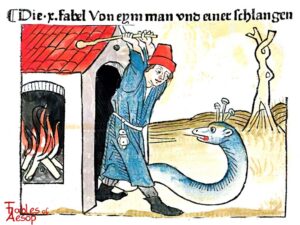The Farmer and the Snake (from the Fables of Aesop)

Ով որ չար կ'ուզէ բարերարին,
Վնաս կ'ընէ իր չար անձին։
Երկրագործ մը
Որչափ աղէկութիւն ընես օձին՝ տեղն որ գայ կը խայթէ իր բարերարը. ասանկ ալ ապերախտ մարդուն ի՛նչ որ ընես, շուտ մը կը մոռնայ, եւ չար հատուցում ընելու կը ջանայ։
A villager, in a frosty, snowy winter, found a snake under a hedge, almost dead with cold. He could not help having compassion for the poor creature, so brought it home, and laid it upon the hearth near the fire; but it had not lain there long, before (being revived with the heat) it began to erect itself, and fly at his wife and children, filling the whole cottage with dreadful hissings. The Countryman hearing an outcry, and perceiving what the matter was, catched up a mattock, and soon dispatched him; upbraiding him at the same time in these words—'Is this, vile wretch, the reward you make to him that saved your life? Die, as you deserve; but a single death is too good for you.'
It is the nature of ingrates to return evil for good: and the moralists, in all ages, have incessantly declaimed against the enormity of this crime, concluding, that they who are capable of hurting their benefactors, are not fit to live in a community; being such, as the natural ties of parent, friend, or country, are too weak to restrain within the bounds of society. Indeed, the sin of ingratitude is so detestable, that as none but the most inhuman temper can be guilty of it, so, in writing to men, there is no occasion to use many words, either in exposing the vice itself, or dissuading people from the commission of it. Therefore it is not likely that a person of Aesop's sagacity would have compiled this fable, without having something else in view besides this trite and obvious subject. He certainly intended to put us in mind that, as none but a poor silly clown would go to take up a Snake and cherish it, so we shall be very negligent and ill-advised if, in doing good offices, we do not take care to bestow our benevolence upon proper objects. It was not at all unnatural in the Snake to hiss, and brandish his tongue, and fly at the first that came near him; as soon at the person that saved his life as any other; indeed, more likely, because nobody else had so much to do with him. Nor is it strange at any time to see a reprobate fool throwing his poisonous language about, and committing his extravagancies against those,more especially, who are so inadvertent as to concern themselves with him. The Snake and the reprobate will not appear extraordinary in their malevolence: but the sensible part of mankind cannot help thinking those guilty of great indiscretion, who receive either of them into their protection.


Comments
Post a Comment